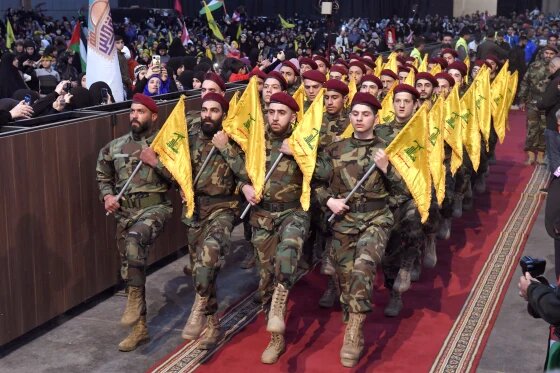Israel beating the drums of full-scale war with Hezbollah

TEHRAN - Speculations over a full-blown conflict between Israel and Lebanon’s Hezbollah resistance movement have been in the limelight during the past days in the wake of the regime’s intensified attacks against the Mediterranean country.
Since Israel launched war on Gaza on October 7, there have been near-daily exchanges of fire between Hezbollah and the Israeli regime along Lebanon’s southern border with the occupied territories.
This week, tensions further escalated after Israeli warplanes carried out deadly strikes on eastern Lebanon for the second time since the Gaza war erupted. They targeted areas near the city of Baalbek in the Bekaa Valley. This region had already come under Israeli attacks in late February.
The latest Israeli strikes on eastern Lebanon, which caused civilian casualties, aroused public anger.
Israel claims it hit Hezbollah’s positions but facts on the ground indicate that a residential building was bombed.
Lebanon urges UNSC action
Israel’s increasing attacks deep inside Lebanon also drew severe condemnation from the Lebanese government and the country’s Foreign Ministry announced it will file a complaint at the UN Security Council.
In a statement, the ministry denounced the regime’s “violent” attacks saying they have killed and injured numerous innocent civilians within residential areas.
“What is particularly concerning is that this escalation is occurring in areas far from the southern Lebanese borders, indicating Israel’s desire to escalate the conflict and drag the entire region into a war,” the statement added.
The ministry also urged the international community to pressure Israel to halt its continuous escalating attacks against Lebanon and demanded that all members of the Security Council condemn the regime’s strikes.
Hezbollah retaliation
The Lebanese resistance movement has retaliated to the Israeli attacks.
On Tuesday, Hezbollah said its fighters attacked “the Israeli air and missile command center in the Keila barracks” with more than 100 rockets, along with “the missile and artillery base in Yoav” and nearby artillery centers.
The movement noted that the operation was carried out in support of the Palestinians in the Gaza Strip and in response to the Israeli attacks against Lebanese people.
Israeli warmongering
Since Israel attacked Gaza, more than 300 people, including civilians, have been killed in Lebanon amid the exchange of fire between Hezbollah and the regime’s forces. About 20 Israelis have also been killed in the cross-border fire.
Hezbollah has announced that it would stop attacks against Israel if the regime ends its genocidal war on Gaza.
But Israel is beating the drums of war amid concerns over the spillover of the Gaza war into the entire region.
Itamar Ben-Gvir, a far-right minister, has called on the Cabinet of Prime Minister Benjamin Netanyahu to declare war on Lebanon.
“We have to start responding, attacking – war, now….Gallant (Israel’s war minister) the military is your responsibility. What are you waiting for?” Ben-Gvir said in a statement on X on Tuesday.
Israel’s warmongering approach indicates that the regime may turn its full focus to the Lebanese front if a ceasefire is reached in Gaza.
Netanyahu dreams
The Israeli prime minister is under increasing pressure over his regime’s failure to predict and forestall the October 7 attack by Hamas which was followed by Israel’s brutal onslaught on Gaza. As a result, a permanent state of war could offer him a lifeline.
Presently, Netanyahu believes that keeping Israel at war either with resistance groups in Gaza or Lebanon’s Hezbollah can help him remain in power.
Nonetheless, a report released by the U.S. intelligence community on Monday showed that Netanyahu’s days are numbered.
War with Hezbollah
Before a likely ceasefire with Hamas, Netanyahu has intensified strikes on Lebanon as a prelude to an all-out war.
The Hezbollah resistance movement has already fought off two Israeli wars against the country in 2000 and 2006. Hezbollah forced Israel to retreat in both conflicts.
Since the 2006 war, Hezbollah has considerably boosted its military capabilities in the face of Israeli aggression.
Hezbollah Secretary General Seyyed Hassan Nasrallah has already said that the resistance group has 100,000 fighters.
Hezbollah is underpinned by its sophisticated arsenal and has increased its stockpile of missiles from 14,000 in 2006 to about 150,000. The movement has also developed precision-guided missiles and its drone programs.
Earlier this month, Hezbollah issued a stern warning to Israel over waging a war on Lebanon.
“We, hereby, declare that if they commit a foolish act and attack our territories, there would then be a new version of the 2006 July war,” Hezbollah Deputy Secretary General Sheikh Naim Qassem said.
The Netanyahu regime can launch a war on Hezbollah but it won’t be able to determine its fate.
Undoubtedly, Hezbollah’s response to such an Israeli onslaught would be the final nail in the regime’s coffin.
